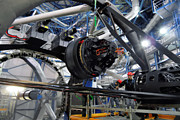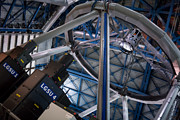Annuncio
AOF, l'impianto per l'ottica adattiva del VLT dell'ESO riceve il premio 2018 per il gruppo tecnologico di eccellenza Paul F. Forman
18 Settembre 2018
Il lavoro pioneristico del gruppo AOF (Adaptive Optics Facility) dell'ESO è stato riconosciuto dalla Optical Society (OSA). Il gruppo AOF è stato insignito del premio 2018 per il gruppo tecnologico di eccellenza Paul F. Forman (Paul F. Forman Team Engineering Excellence Award). Il premio OSA è stato consegnato durante la cerimonia di premiazione di Frontiers in Optics (FiO) + Laser Science (LS) tenutasi il 17 settembre a Washington DC, USA.
Il gruppo di lavoro ha ricevuto il premio per aver fortito l'ottica adattiva a Yepun, il telescopio UT4 da 8,2 metri di diametro del VLT (Very Large Telescope) dell'ESO. L'AOF è stato un importante progetto per migliorare la capacità visiva degli strumenti MUSE (Multi Unit Spectroscopic Explorer) e HAWK-I (High Acuity Wide-field K-band Imager), fornendo loro la abilità di compensare l'effetto di sfocatura dovuto all'atmosfera terrestre [1].
L'ingegneria precisa e complessa insita in AOF è stata ora riconosciuta con il Paul F. Forman Team Excellence Award Award, accettato da Elise Vernet, Johann Kolb e Robin Arsenault per conto del team AOF. Il premio viene presentato ogni anno per celebrare i risultati tecnici o i contributi alla società più alti nel campo dell'ingegneria ottica ed è stato precedentemente assegnato a equipe di ingegneri che lavorano su progetti rivoluzionari come l'esperimento Advanced LIGO, noto per aver rilevato le onde gravitazionali prodotte dalla collisione di buchi neri e stelle di neutroni.
L'ingegneria dei telescopi dell'ESO ha già ricevuto il riconoscimento di questo prestigioso premio. Nel 2017, la Guide Star Alliance ha ricevuto il premio per la produzione di laser per stella guida ad alta potenza (SodiumStar). SodiumStar è stato il risultato di una collaborazione industriale tra il team AOF dell'ESO, TOPTICA Photonics e MPB Communications (MPBC) ed è stato riconosciuto come tecnologia fondamentale per la prossima generazione di telescopi terrestri [2].
Attraverso questo eccellente esempio di ingegneria pioneristica, il gruppo di AOF ha fornito agli astronomi negli Stati membri dell'ESO uno strumento prezioso per esplorare l'universo. Inoltre, l'esperienza acquisita dagli ingegneri dell'ESO si rivelerà fondamentale per superare future sfide ingegneristiche, come la costruzione dell'ELT (Extremely Large Telescope), il più grande occhio del mondo rivolto al cielo.
Note
[1] L'AOF è composto da molte parti che lavorano insieme, tra cui 4LGSF (Four Laser Guide Star Facility) e il sottilissimo specchio secondario deformabile di UT4. Il 4LGSF punta verso il cielo i quattro raggi laser da 22 watt per far brillare gli atomi di sodio nello strato superiore dell'atmosfera, producendo punti di luce che imitano le stelle. I sensori nei moduli di ottica adattiva GRAAL e GALACSI utilizzano queste stelle guida artificiali per determinare le condizioni atmosferiche e le correzioni necessarie per migliorare la qualità dell'immagine. Mille volte al secondo, il sistema AOF si adatta alle condizioni atmosferiche cambiando la forma dello Specchio Secondario Deformabile del telescopio per compensare i disturbi atmosferici. Ciò richiede il coordinamento tra molti diversi sottosistemi ed è ciò che consente all'AOF di fornire a MUSE e HAWK-I uno sguardo così squisitamente sensibile.
[2] Altre partnership industriali sono state determinanti per il successo dell'AOF. Microgate e ADS hanno consegnato lo Specchio Secondario Deformabile (Deformable Secondary Mirror), una parte integrante del quale è lo specchio a guscio sottile da 1,1 m prodotto da SAGEM-REOSC. NTE Sener ha consegnato il sistema opto-meccanico GRAAL e TNO ha prodotto i telescopi di lancio per 4LGSF (Four Laser Guide Star Facility). NOVA ha dato importanti contributi alla piattaforma ASSIST utilizzata per qualificare l'AOF in Europa, e il consorzio MUSE, oltre a fornire uno strumento all'avanguardia, ha contribuito a qualificare le prestazioni dell'AOF.
Links
Riguardo all'annuncio
| Identificazione: | ann18066 |
Our use of Cookies
We use cookies that are essential for accessing our websites and using our services. We also use cookies to analyse, measure and improve our websites’ performance, to enable content sharing via social media and to display media content hosted on third-party platforms.
ESO Cookies Policy
The European Organisation for Astronomical Research in the Southern Hemisphere (ESO) is the pre-eminent intergovernmental science and technology organisation in astronomy. It carries out an ambitious programme focused on the design, construction and operation of powerful ground-based observing facilities for astronomy.
This Cookies Policy is intended to provide clarity by outlining the cookies used on the ESO public websites, their functions, the options you have for controlling them, and the ways you can contact us for additional details.
What are cookies?
Cookies are small pieces of data stored on your device by websites you visit. They serve various purposes, such as remembering login credentials and preferences and enhance your browsing experience.
Categories of cookies we use
Essential cookies (always active): These cookies are strictly necessary for the proper functioning of our website. Without these cookies, the website cannot operate correctly, and certain services, such as logging in or accessing secure areas, may not be available; because they are essential for the website’s operation, they cannot be disabled.
Functional Cookies: These cookies enhance your browsing experience by enabling additional features and personalization, such as remembering your preferences and settings. While not strictly necessary for the website to function, they improve usability and convenience; these cookies are only placed if you provide your consent.
Analytics cookies: These cookies collect information about how visitors interact with our website, such as which pages are visited most often and how users navigate the site. This data helps us improve website performance, optimize content, and enhance the user experience; these cookies are only placed if you provide your consent. We use the following analytics cookies.
Matomo Cookies:
This website uses Matomo (formerly Piwik), an open source software which enables the statistical analysis of website visits. Matomo uses cookies (text files) which are saved on your computer and which allow us to analyze how you use our website. The website user information generated by the cookies will only be saved on the servers of our IT Department. We use this information to analyze www.eso.org visits and to prepare reports on website activities. These data will not be disclosed to third parties.
On behalf of ESO, Matomo will use this information for the purpose of evaluating your use of the website, compiling reports on website activity and providing other services relating to website activity and internet usage.
Matomo cookies settings:
Additional Third-party cookies on ESO websites: some of our pages display content from external providers, e.g. YouTube.
Such third-party services are outside of ESO control and may, at any time, change their terms of service, use of cookies, etc.
YouTube: Some videos on the ESO website are embedded from ESO’s official YouTube channel. We have enabled YouTube’s privacy-enhanced mode, meaning that no cookies are set unless the user actively clicks on the video to play it. Additionally, in this mode, YouTube does not store any personally identifiable cookie data for embedded video playbacks. For more details, please refer to YouTube’s embedding videos information page.
Cookies can also be classified based on the following elements.
Regarding the domain, there are:
- First-party cookies, set by the website you are currently visiting. They are stored by the same domain that you are browsing and are used to enhance your experience on that site;
- Third-party cookies, set by a domain other than the one you are currently visiting.
As for their duration, cookies can be:
- Browser-session cookies, which are deleted when the user closes the browser;
- Stored cookies, which stay on the user's device for a predetermined period of time.
How to manage cookies
Cookie settings: You can modify your cookie choices for the ESO webpages at any time by clicking on the link Cookie settings at the bottom of any page.
In your browser: If you wish to delete cookies or instruct your browser to delete or block cookies by default, please visit the help pages of your browser:
Please be aware that if you delete or decline cookies, certain functionalities of our website may be not be available and your browsing experience may be affected.
You can set most browsers to prevent any cookies being placed on your device, but you may then have to manually adjust some preferences every time you visit a site/page. And some services and functionalities may not work properly at all (e.g. profile logging-in, shop check out).
Updates to the ESO Cookies Policy
The ESO Cookies Policy may be subject to future updates, which will be made available on this page.
Additional information
For any queries related to cookies, please contact: pdprATesoDOTorg.
As ESO public webpages are managed by our Department of Communication, your questions will be dealt with the support of the said Department.



